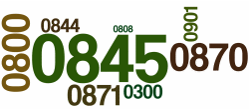Types of telephone number
 Your business doesn’t have to settle for a standard telephone number, starting ‘01…’ or ‘02…’. If you prefer, you can choose a non-geographic number
Your business doesn’t have to settle for a standard telephone number, starting ‘01…’ or ‘02…’. If you prefer, you can choose a non-geographic number
Most telephone suppliers are able to offer non-geographic numbers, perhaps as part of a VoIP system. They can bring a number of benefits to your company, including:
- Flexible call routing. You can choose where calls to your non-geographic number are directed. So, for instance, you can route calls to your main office during the day, but switch to a satellite office overnight.
- Fault correction. If there’s a problem with the telephone lines running into your premises, you can immediately redirect a non-geographic number elsewhere.
- More advanced options. Depending on your telephone supplier, it’s sometimes easier to get advanced features like call queuing, call recording and voicemail when using a non-geographic number.
- Improved company profile. Some companies believe that a non-geographic number makes them look more established. You can also get listed in every UK phone book.
- Portable and cost-effective. You can take your number with you if you relocate, so there’s no need to reprint business cards or sales material.
- Track advertising campaigns. By advertising different telephone numbers in different places, you can track the effectiveness of your advertising.
There are several types of non-geographic phone numbers. Each has different benefits.
Freephone numbers
Freephone numbers usually start ‘0808…’ or ‘0800…’. These cost nothing to call from a landline, so are ideal for when you want to encourage people to call you.
Currently, most mobile phone networks charge callers for ringing freephone numbers. However, from summer 2015, '0800' and '0808' numbers will become free to call from both landline and mobile phone lines.
Freephone numbers are ideal for:
- Premium customer care, when you want to offer help without charging customers.
- Mass marketing campaigns. Using freephone numbers in press advertising can increase response rates.
- New business acquisition. Many companies take sales calls through a freephone number.
If you set up a freephone number, you’ll have to cover the call costs. These vary depending on your supplier and the volume of calls, but expect to pay at least 1.5p per minute.
Local rate phone numbers
Local rate phone numbers usually start ‘0845…’ or ‘0844…’. From a landline, the cost of calling them is similar that of a local telephone call. Calling them from a mobile can cost more. Businesses tend to use local rate numbers when they want to keep the cost of calling relatively low. For instance:
- Advice lines, where you answer customer questions.
- Response lines, where you want to encourage people to call but don’t want to offer a freephone number.
- Brochure requests. Using a local rate number for warm leads (like brochure requests) strikes a good balance between encouraging calls and keeping costs down.
From 2015, the costs of calling a local rate number will be changing. Call charges will be made up of two components: an access charge priced per minute and set by the caller's phone company and a service charge which is set by the organisation being called.
It shouldn't cost much to set up a local rate phone number. You shouldn’t have to pay anything for the call charges (these are covered by callers), though you might have to pay a monthly or quarterly fee.
UK-wide numbers
UK-wide numbers are a relatively new type of number starting ’03…’. Calls to these numbers cost the same as calls to a normal telephone number (starting ’01…’ or ’02…’) – regardless of whether that call is made from a UK landline or mobile phone.
Because mobile phone users don't pay more to call UK-wide numbers (calls to 03 numbers count towards the minutes included with mobile phone tariffs), they make an excellent alternative to local-rate numbers.
UK-wide numbers are cheap to set up - expect to pay from £10 per month. Depending on your provider, you may also have to pay a small amount towards the cost of calls.
National rate numbers
These numbers start ‘0870…’ or ‘0871…’ and give your business a 'national presence'. As these numbers are billed to the caller at a national rate (typically 10p per minute from a landline, often more from a mobile), they can generate an income for you.
National rate numbers are ideal for:
- Help and support lines. The cost of the call encourages customers to phone only when necessary, and can help subsidise the service you provide.
- Out of office hours contact. Using a national rate number for out of hours calls can give customers a reason to phone during normal business hours.
- Diverting calls to mobiles. If your staff work from home or on the move, revenue from a national rate number can offset the cost of diverting calls to their mobiles.
For regulatory purposes, national rate numbers are treated similarly to premium rate numbers (see below), so to operate one you need to make sure you meet the rules.
Premium rate numbers
Premium rate numbers, which start ’09…’, cost anything from 10p per minute up to £2.95 per minute to call from a landline, or more from a mobile phone. They’re often used for competitions or by businesses that want to generate significant revenue through call charges.
Many companies find that using them sends a clear message to customers: ‘don’t call us’! Strict regulations govern the use of premium rate numbers too - you need to make sure you follow the code of practice published by PhonepayPlus, the UK regulatory body.
There are lots of telephone numbers suppliers able to offer all these different types of number. To get started, search online and ask around for recommendations.




